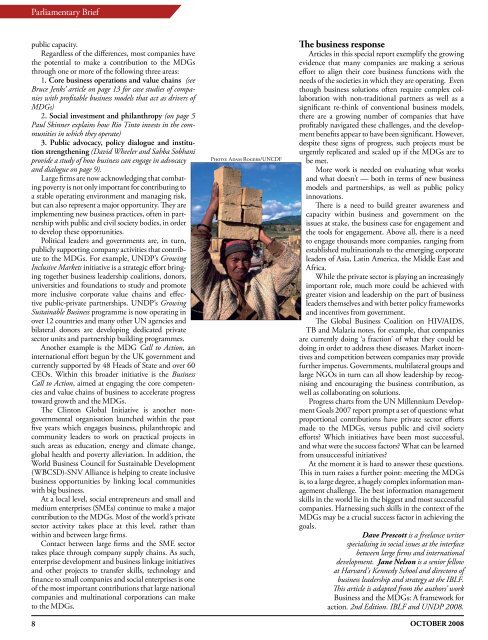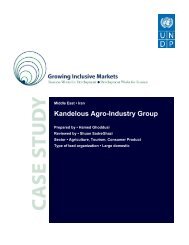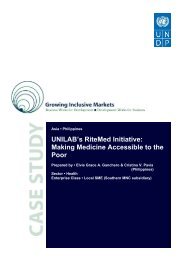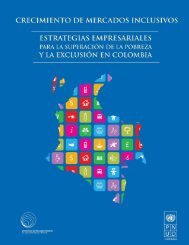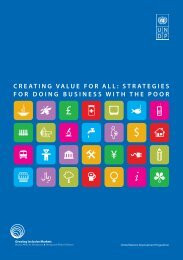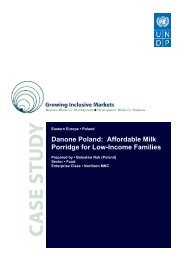Meet the consumer today's business needs to targe
Meet the consumer today's business needs to targe
Meet the consumer today's business needs to targe
- No tags were found...
You also want an ePaper? Increase the reach of your titles
YUMPU automatically turns print PDFs into web optimized ePapers that Google loves.
Parliamentary Briefpublic capacity.Regardless of <strong>the</strong> differences, most companies have<strong>the</strong> potential <strong>to</strong> make a contribution <strong>to</strong> <strong>the</strong> MDGsthrough one or more of <strong>the</strong> following three areas:1. Core <strong>business</strong> operations and value chains (seeBruce Jenks’ article on page 13 for case studies of companieswith profitable <strong>business</strong> models that act as drivers ofMDGs)2. Social investment and philanthropy (on page 5Paul Skinner explains how Rio Tin<strong>to</strong> invests in <strong>the</strong> communitiesin which <strong>the</strong>y operate)3. Public advocacy, policy dialogue and institutionstreng<strong>the</strong>ning (David Wheeler and Sahba Sobhaniprovide a study of how <strong>business</strong> can engage in advocacyand dialogue on page 9).Large firms are now acknowledging that combatingpoverty is not only important for contributing <strong>to</strong>a stable operating environment and managing risk,but can also represent a major opportunity. They areimplementing new <strong>business</strong> practices, often in partnershipwith public and civil society bodies, in order<strong>to</strong> develop <strong>the</strong>se opportunities.Political leaders and governments are, in turn,publicly supporting company activities that contribute<strong>to</strong> <strong>the</strong> MDGs. For example, UNDP’s GrowingInclusive Markets initiative is a strategic effort bringing<strong>to</strong>ge<strong>the</strong>r <strong>business</strong> leadership coalitions, donors,universities and foundations <strong>to</strong> study and promotemore inclusive corporate value chains and effectivepublic-private partnerships. UNDP’s GrowingSustainable Business programme is now operating inover 12 countries and many o<strong>the</strong>r UN agencies andbilateral donors are developing dedicated privatesec<strong>to</strong>r units and partnership building programmes.Ano<strong>the</strong>r example is <strong>the</strong> MDG Call <strong>to</strong> Action, aninternational effort begun by <strong>the</strong> UK government andcurrently supported by 48 Heads of State and over 60CEOs. Within this broader initiative is <strong>the</strong> BusinessCall <strong>to</strong> Action, aimed at engaging <strong>the</strong> core competenciesand value chains of <strong>business</strong> <strong>to</strong> accelerate progress<strong>to</strong>ward growth and <strong>the</strong> MDGs.The Clin<strong>to</strong>n Global Initiative is ano<strong>the</strong>r nongovernmentalorganisation launched within <strong>the</strong> pastfive years which engages <strong>business</strong>, philanthropic andcommunity leaders <strong>to</strong> work on practical projects insuch areas as education, energy and climate change,global health and poverty alleviation. In addition, <strong>the</strong>World Business Council for Sustainable Development(WBCSD)-SNV Alliance is helping <strong>to</strong> create inclusive<strong>business</strong> opportunities by linking local communitieswith big <strong>business</strong>.At a local level, social entrepreneurs and small andmedium enterprises (SMEs) continue <strong>to</strong> make a majorcontribution <strong>to</strong> <strong>the</strong> MDGs. Most of <strong>the</strong> world’s privatesec<strong>to</strong>r activity takes place at this level, ra<strong>the</strong>r thanwithin and between large firms.Contact between large firms and <strong>the</strong> SME sec<strong>to</strong>rtakes place through company supply chains. As such,enterprise development and <strong>business</strong> linkage initiativesand o<strong>the</strong>r projects <strong>to</strong> transfer skills, technology andfinance <strong>to</strong> small companies and social enterprises is oneof <strong>the</strong> most important contributions that large nationalcompanies and multinational corporations can make<strong>to</strong> <strong>the</strong> MDGs.Pho<strong>to</strong>: Adam Rogers/UNCDFThe <strong>business</strong> responseArticles in this special report exemplify <strong>the</strong> growingevidence that many companies are making a seriouseffort <strong>to</strong> align <strong>the</strong>ir core <strong>business</strong> functions with <strong>the</strong><strong>needs</strong> of <strong>the</strong> societies in which <strong>the</strong>y are operating. Eventhough <strong>business</strong> solutions often require complex collaborationwith non-traditional partners as well as asignificant re-think of conventional <strong>business</strong> models,<strong>the</strong>re are a growing number of companies that haveprofitably navigated <strong>the</strong>se challenges, and <strong>the</strong> developmentbenefits appear <strong>to</strong> have been significant. However,despite <strong>the</strong>se signs of progress, such projects must beurgently replicated and scaled up if <strong>the</strong> MDGs are <strong>to</strong>be met.More work is needed on evaluating what worksand what doesn’t — both in terms of new <strong>business</strong>models and partnerships, as well as public policyinnovations.There is a need <strong>to</strong> build greater awareness andcapacity within <strong>business</strong> and government on <strong>the</strong>issues at stake, <strong>the</strong> <strong>business</strong> case for engagement and<strong>the</strong> <strong>to</strong>ols for engagement. Above all, <strong>the</strong>re is a need<strong>to</strong> engage thousands more companies, ranging fromestablished multinationals <strong>to</strong> <strong>the</strong> emerging corporateleaders of Asia, Latin America, <strong>the</strong> Middle East andAfrica.While <strong>the</strong> private sec<strong>to</strong>r is playing an increasinglyimportant role, much more could be achieved withgreater vision and leadership on <strong>the</strong> part of <strong>business</strong>leaders <strong>the</strong>mselves and with better policy frameworksand incentives from government.The Global Business Coalition on HIV/AIDS,TB and Malaria notes, for example, that companiesare currently doing ‘a fraction’ of what <strong>the</strong>y could bedoing in order <strong>to</strong> address <strong>the</strong>se diseases. Market incentivesand competition between companies may providefur<strong>the</strong>r impetus. Governments, multilateral groups andlarge NGOs in turn can all show leadership by recognisingand encouraging <strong>the</strong> <strong>business</strong> contribution, aswell as collaborating on solutions.Progress charts from <strong>the</strong> UN Millennium DevelopmentGoals 2007 report prompt a set of questions: whatproportional contributions have private sec<strong>to</strong>r effortsmade <strong>to</strong> <strong>the</strong> MDGs, versus public and civil societyefforts? Which initiatives have been most successful,and what were <strong>the</strong> success fac<strong>to</strong>rs? What can be learnedfrom unsuccessful initiatives?At <strong>the</strong> moment it is hard <strong>to</strong> answer <strong>the</strong>se questions.This in turn raises a fur<strong>the</strong>r point: meeting <strong>the</strong> MDGsis, <strong>to</strong> a large degree, a hugely complex information managementchallenge. The best information managementskills in <strong>the</strong> world lie in <strong>the</strong> biggest and most successfulcompanies. Harnessing such skills in <strong>the</strong> context of <strong>the</strong>MDGs may be a crucial success fac<strong>to</strong>r in achieving <strong>the</strong>goals.Dave Prescott is a freelance writerspecialising in social issues at <strong>the</strong> interfacebetween large firms and internationaldevelopment. Jane Nelson is a senior fellowat Harvard’s Kennedy School and direc<strong>to</strong>ro of<strong>business</strong> leadership and strategy at <strong>the</strong> IBLF.This article is adapted from <strong>the</strong> authors’ workBusiness and <strong>the</strong> MDGs: A framework foraction. 2nd Edition. IBLF and UNDP 2008.OCTOBER 2008


